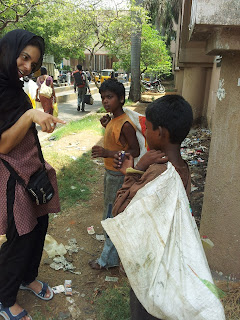At the outset I must admit that I cannot claim to be an expert on a region's socio-economic dynamics through my few hours of its touring. Yet, the caste based divides and the exploitative character of this caste system in Shivpuri is so flagrant that any empathetic observer cannot help but notice it.
This district is infamous in the "global development circles" (meaning the UNICEF, UNDP and the other practitioners of top-down policy models) for its appalling malnutrition levels among children. Huge funds have been poured in from the very same agencies so as to uplift the "tribal masses". Yet the affect of such international intervention over the last decade is for all to see.
I would like to sum up a few observations that I came across in a few hours of my touring -
The region has been the "summer capital" of the Scindias who have used its jungles for hunting and building elaborate luxury castles. The same family holds all the representative seats in the parliament for this region; On the left side is a dalit landless agricultural worker who has never seen stable employment, and has never been "selected" for any MGNREGS based work (when it is their right to get 100 days of work per year) by the panchayat officials. I wonder how he can share the emphatic feeling of the seemingly omnipresent writing on the wall.
In the local political scene, the marginalised communities claim of political neglect by all the elected candidates of the last three decades. The First-Past-The-Post system has allowed some candidates to win even with less than 10% votes of the village. In such a case all the benefits are allegedly captured by those belonging to their political clan and the rest feel unrepresented.
In terms of administrative empowerment, the first major stumbling factor in policy administration process is that tribal communities are treated as passive beneficiaries, with no right to choose and no ability to decide. This kind of an approach favours development of nexuses that enrich a few while rendering all public intervention futile.
Almost all the tribals complained of the domination of the upper castes in the lower level bureaucracy. This "world class" medical facility opened at the heart of the remote tribal region of Charch using UNICEF funding seems to resonate the same trend. All the employees mentioned on the board are upper castes - the same as those of the anganwadi centres, panchayat secretaries and numerous other grass-root level public functionaries.
In terms of initial endowments, there seemed to be two groups within the SC population of the district - while some of the Jatavs (belonging to the SC community) were well-off (from rural Indian standards), most of the other Jatavs and other SC community were living in dilapidated conditions and held no land or stable employment.
 For the adivasis (tribals), there was no land or labour opportunities to talk about. The businesses in the villages marked as "tribal" for the purpose of BRGF (Backward Region Grant Fund) always seemed to be owned by upper caste Hindus who employed the tribals as casual labourers. The tribal gentleman on the right laughed at the question when I asked him if he owned land or if any revenue land ("patta") was allocated to him. He explained how a tribal spends his entire life in a hand-to-mouth existence and the only jobs they aspire for are in the illegal mining quarries of the region.
For the adivasis (tribals), there was no land or labour opportunities to talk about. The businesses in the villages marked as "tribal" for the purpose of BRGF (Backward Region Grant Fund) always seemed to be owned by upper caste Hindus who employed the tribals as casual labourers. The tribal gentleman on the right laughed at the question when I asked him if he owned land or if any revenue land ("patta") was allocated to him. He explained how a tribal spends his entire life in a hand-to-mouth existence and the only jobs they aspire for are in the illegal mining quarries of the region.
I can't end the post without mentioning a grandeous statement made by the senior district official who was incharge of our visit.
"Arrey bhai (to his subordinate) inhein wahaan le jaana uss sansthan mein jahaan humne un adivasiyon ko nehla-dhula kar unka mundan karwaya tha. (to us) kuchch adivasiyon mein bimariyon ki badi samasya thi, maine dekha toh paaya ki inhe dawaiyon ki nahi hygiene ki jaroorat hai - unko badhiya nehle dhula kar shave banwa kar taiyar kiya aur ensure kiya ki voh nahaye - ab aap log jayenge toh dekhna - koi bimari nahi hai udhar ! (smiling to himself)"
[He asked his subordinate to take us to an organisation where he had made a set of tribals, complaining of health problems, to have a bath and shave daily - he claimed that itself cured the diseases in those tribals].
What struck me in this assertion was not the seemingly fuzzy connection between shaving one's stubble and falling ill (After all, hygiene is an important factor in health), but the way he said it. The air of superiority and wisdom he echoed could have been the same if he were to be talking of some non human species that are to be managed by him. Clearly, the idea of "participation of tribals in making of decisions that affect them", will be incomprehensibly bizarre for him in the near future.

















